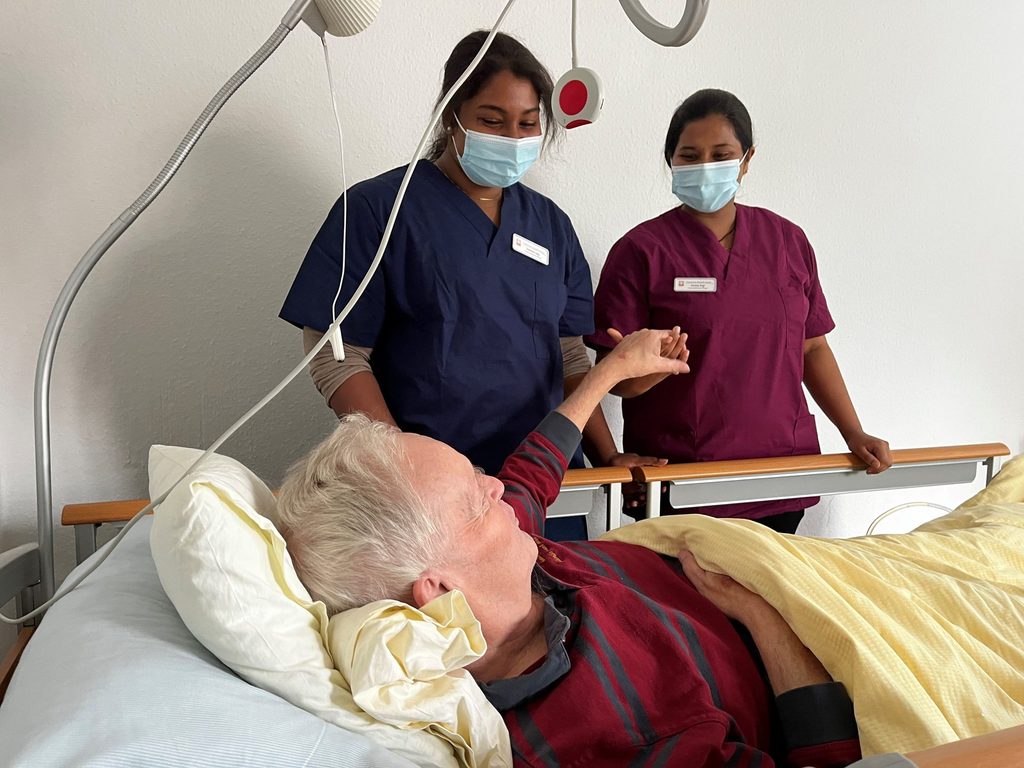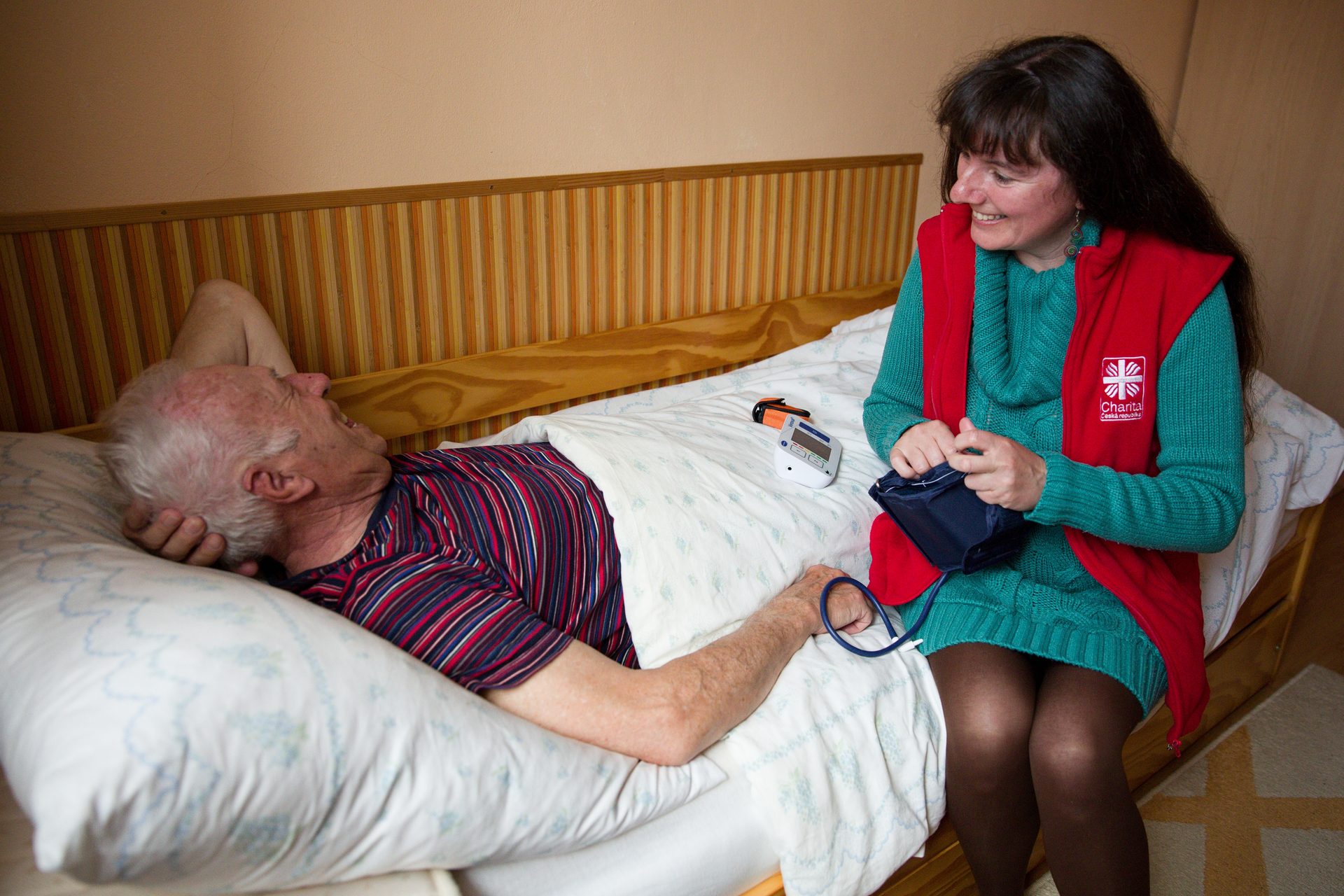Michaela Theuer, a Caritas nurse, manages to get to on average seven homes in less than three hours. Caritas Cologne's mobile nurses start their shifts at 7:15am and by 10am they have already visited seven patients, driving to different parts of the city. Their services are increasingly in demand as the local population ages, and caregivers are short in supply. Their routine activities include washing patients, getting them dressed and brushing their hair.
They also give different types of injections, take blood sugar and blood pressure levels and help to put on compression socks. They make sure necessary medication is taken and, as needed, help with preparing meals and other tasks, such as collecting the post. Yet the allocated hours are not enough to assist people needing care despite Caritas’ person-centred approach. Some need support throughout the day; however, the time the nurses can dedicate to each person becomes shorter and shorter.
The latest Caritas European report "Growing old with dignity" analyses the current complex situation in the long-term care sector in 13 European countries and proposes concrete solutions, based on examples rooted in the long experience of Caritas, one of Europe’s biggest social service providers, and on the experiences of people living in conditions of vulnerability. For instance, higher wages, more full-time opportunities, better working conditions as well as the regularisation of informal care workers are among the most urgent remedies to ensure accessible, affordable quality care for all.
According to the latest European Commission figures, 46.5% of people in the EU aged 65 or over with severe difficulties in maintaining their own personal care reported that their needs were not being met. This lack of help was significantly greater for those on a lower income.
Why? "Lack of personnel" - explains Michaela – "there are millions of reasons for this job not being attractive to young people," and it is extremely difficult to recruit and retain long-term care workers.
Lawmakers and public authorities should make more significant efforts to address this labour shortage by trying to valorise the care sector. Considering also that within the European Union, the east-west divide keeps growing as many workers, mostly women, leave countries like Romania to work as caregivers in wealthier Member States, like Austria and Germany, with higher salaries. The consequences of the so-called "care drain" in the country of origin can be devastating, leaving many elderly people without assistance.

Senior Caritas beneficiaries socialise as part of Caritas inclusion programme. Credit: Caritas Poland
As one of the 13 Caritas Europa member organisations contributing to the report, Caritas Romania states: "Long-term care is underdeveloped in Romania. Over 95% of the elderly are cared for informally. Services are not available in sufficient numbers to those who need them and are extremely rare in rural areas and small towns."
Romania's neighbouring countries such as Moldova and Ukraine (also analysed in the report) and other non-EU countries are experiencing similar conditions.
Shannon Pfohman, Caritas Europa's Policy and Advocacy Director, emphasises that: "Legal migration is increasingly being perceived as a key solution to remedy these labour shortages, demonstrating the important contributions migrants make to European societies” – but she adds that – “a focus on labour mobility alone will only put a band aid on a more structural problem, namely the need to reform the long-term care system to better respond to Europe's ageing society". Consequently, European countries should engage in ending undeclared care work to avoid exploitation and provide caregivers with training to advance in their careers.
Despite the difficulties, Wolfram Heinrich, a long-experienced nurse from Caritas in Germany, explains why caring for people is also highly motivating work. "As a caregiver, you try to maintain the self-esteem of elderly people who are fully dependent on you. You can give someone who is soon going to leave this world some quality time at the end of his or her life," he explains.
Along the same lines, Caritas Europa’s Secretary General Maria Nyman states: "Respecting the dignity of older people means allowing them to live independently for as long as possible, offering community-based services and support in line with their needs and wishes".
Assisting people can be done in many ways: at home, in community-based facilities and in state retirement facilities. Nyman stresses that EU States should invest more in non-profit care service providers to respond - in a dignified and personalised way - to the growing demand for care services.
According to the German nurse Heinrich, the care sector should not be focused on profit making. "If you sell cars, you want to make a profit, but if you care for people, that's not something to take a high profit from."
One day we may all need assistance. Investing now in long-term care that respects the dignity and rights of all persons can truly contribute to the well-being of our societies.

Trainees share an exchange with a beneficiary Caritas Germany
Caritas Europa solutions:
- Increase public investments to ensure that quality long-term care is accessible and affordable for all.
- Ensure a person-centred approach.
- Improve wages and working conditions and end overreliance on undeclared care work.
- Incentivise not-for-profit services.
- Expand regular labour migration and set up more regularisation schemes.
Information about Caritas Europa
Caritas Europa is a network of 49 Caritas organisations in 46 countries across Europe fighting poverty and serving people living in the most marginalised and vulnerable situations. Caritas is one of Europe's biggest social service providers that works on care.

